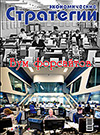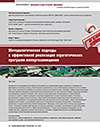Opportunities for the development of critical industries in Russia under sanctions
DOI: 10.33917/mic-5.118.2024.26-40
The machine tool industry, microelectronics and the aviation industry are among the critically important sectors of the economy of any industrialized state, as they determine the technological sovereignty of industry and ensure the technological security of the country, as well as set the direction of innovative development. These industries have been the target of sanctions imposed by Western countries on Russia against the background of the Ukrainian crisis. «Unfriendly» states have imposed a ban on the supply of machine tools and components to the Russian Federation; microcircuits and other microelectronics; aircraft and their spare parts (including engines), in addition, leasing agreements with Russian airlines were terminated and aircraft maintenance was discontinued. In this regard, the industries in question faced serious challenges – to find a replacement for Western supplies as soon as possible and to mobilize their own production facilities. Even though the problem of dependence of the machine-tool, microelectronic and aviation industries on foreign supplies has been discussed for about 10 years (since the «Crimean» sanctions), no significant results have been achieved in terms of reducing import dependence. There was no collapse due to the restrictions imposed in these industries, but several difficulties arose, which require government support to solve.
References:
1. Analysis of the processor and controller market in Russia in 2018–2022, forecast for 2023–2027 under sanctions. BusinessStat. 2023. URL: https://businesstat.ru/news/processors_and_controllers/
2. Afanasyev A. The market for Russian machine tool products under external restrictions. Economy, entrepreneurship and law. 2023;13(10):4073–4088.
3. Butov A. The market for civil aircraft products. HSE Development Center. 2018. URL: https://dcenter.hse.ru/data/2018/11/19/1141804200/
4. State support for microelectronics in 2024 will amount to 210 billion rubles. Interfax. 2023. URL: https://www.interfax.ru/russia/925028
5. Kapoguzov E. Import dependence of the Russian civil aviation industry. Bulletin of Tomsk State University. Economics. 2022;58:58–76.
6. Comprehensive program for the development of the air transport industry of the Russian Federation until 2030. URL: http://static.government.ru/media/files/
7. Kostyuchenko S. The role of machine tool building in the modern economy and its impact on various industries and production processes. Economy and Society: Modern Development Models, 2023;13(3):177–194.
8. Microelectronics of Russia: from deficit to technological independence. Yakov and partners. 2023. URL: https://yakov.partners/upload/iblock/f25/
9. The current state of the Russian machine tool industry: problems and prospects. Rhythm of mechanical engineering. URL: https://ritm-magazine.com/ru/public/nastoyashchee-sostoyanie-rossiyskogo-stankostroeniya-problemy-i-perspektivy
10. Russia increased the production of civilian helicopters by 70% in 2022. Vedomosti. 2023. URL: https://www.vedomosti.ru/business/articles/2023/02/20/963574-rossiya-uvelichila-vipusk-grazhdanskih-vertoletov





